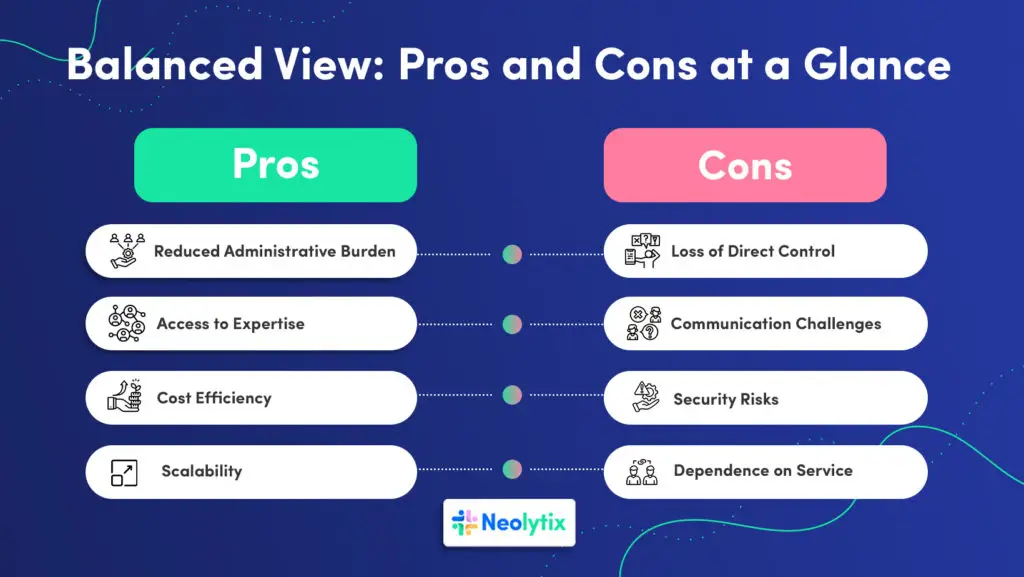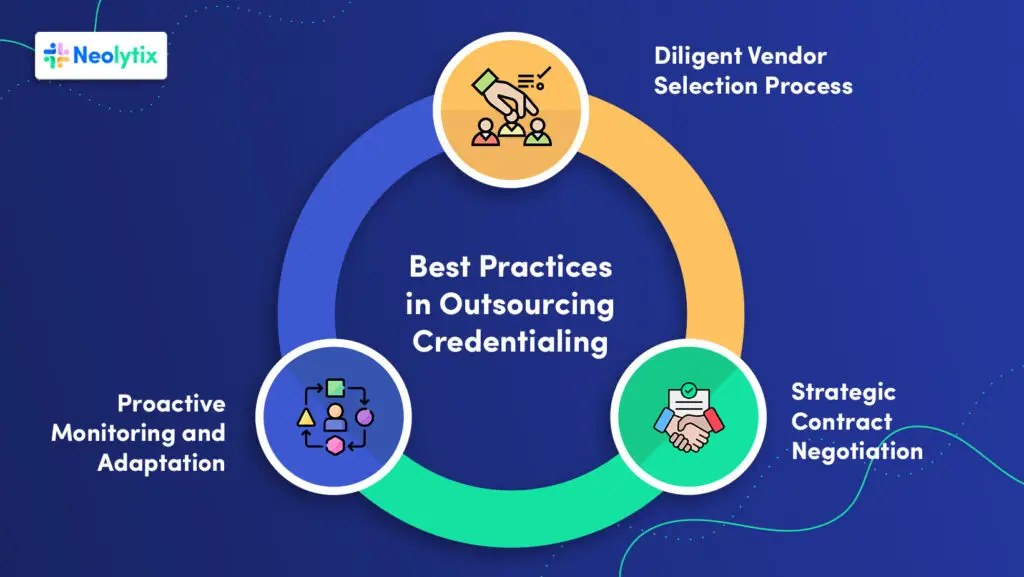Credentialing is a fundamental aspect of healthcare management, ensuring that medical providers meet the necessary standards and regulations to maintain quality patient care. This process involves extensive verification of qualifications, training, and history of conduct, making it essential yet resource-intensive.
As healthcare systems strive for greater efficiency and focus on core competencies, outsourcing credentialing services has become an increasingly attractive option. This approach promises not only to streamline operations but also to enhance the overall efficacy of healthcare delivery.
Balanced View: Pros and Cons at a Glance
In order to provide a clearer perspective on the potential benefits and challenges of outsourcing credentialing, which we will explore in detail later in this article, below is a comparative table outlining the key pros and cons.
This overview will help set the stage for a deeper discussion on each point as we delve into the specifics of whether outsourcing credentialing is the right move for your healthcare organization.
Advantages | Disadvantages |
Reduced Administrative Burden | Loss of Direct Control |
Significantly cuts down on in-house administrative tasks, freeing staff to focus on patient care and other critical operations. | Outsourcing may lead to decreased control over the credentialing process, potentially affecting oversight and internal adjustments. |
Access to Expertise | Communication Challenges |
Outsourcing partners often have specialized knowledge and remain up-to-date with compliance and regulatory changes, enhancing the accuracy and efficiency of the credentialing process. | Differences in time zones, languages, or business practices can complicate communication, potentially leading to misunderstandings or delays. |
Cost Efficiency | Security Risks |
Potentially lowers overall costs by eliminating the need for in-house staff training and benefits. Outsourcing can provide a cost-effective alternative, especially for smaller practices. | Sharing sensitive information with third parties increases the risk of data breaches unless stringent security measures are in place. |
Scalability | Dependence on Service Provider |
Allows healthcare organizations to scale operations up or down based on current demand without the need to hire or lay off staff. | Developing reliance on external providers can be risky if the service quality decreases or if the provider terminates their services unexpectedly. |
The Benefits of Outsourcing Credentialing
Outsourcing credentialing can greatly reduce the administrative burden for healthcare providers, allowing staff to focus on patient care. By partnering with specialized external providers, healthcare facilities save on costs and improve operational efficiency. Let’s explore these benefits in detail.
- Alleviating the Administrative Burden
Outsourcing credentialing can significantly reduce the load of administrative tasks that healthcare organizations face. By transferring these responsibilities to specialized external providers, healthcare facilities can achieve substantial cost savings and more streamlined operations.
This shift allows internal staff to focus on more critical areas rather than getting bogged down by the cumbersome details of the credentialing process, which includes constant updates and renewals of provider licenses and certifications.
- Harnessing Expertise and Enhancing Patient Safety
One of the most compelling advantages of outsourcing credentialing is access to specialized expertise. Credentialing services are well-versed in the latest healthcare regulations and are adept at ensuring compliance.
This expertise not only mitigates the risk of accreditation issues but also enhances patient safety, a paramount concern for healthcare providers. These external teams are detail-oriented and dedicated to maintaining the highest standards of provider qualification and regulatory adherence.
- Boosting Operational Efficiency
The efficiency gained through outsourcing can lead to quicker provider onboarding, meaning healthcare services become available to patients faster than they would with in-house credentialing processes.
Outsourcing credentialing also frees up valuable resources, enabling healthcare providers to concentrate more on patient care rather than administrative duties. This shift in focus can lead to better patient outcomes and higher satisfaction rates as healthcare providers can spend more time with patients and less on paperwork.
- Scalability
Outsourcing credentialing also offers the flexibility to scale healthcare operations according to current demands without the complexity of hiring or laying off staff. This adaptability ensures that organizations can efficiently manage fluctuating workloads, facilitating growth or contraction as needed, without the burden of adjusting internal workforce levels. This can lead to better resource management and cost efficiency across the healthcare spectrum.

The Challenges of Outsourcing Credentialing
Healthcare organizations face a variety of credentialing-related challenges ranging from concerns over control and communication barriers to ensuring top-notch security. Let’s explore the top four challenges healthcare organizations face when outsourcing credentialing services.
- Navigating Loss of Control
A significant concern with outsourcing credentialing is the potential loss of control over critical processes. Healthcare organizations might feel detached from integral operations, affecting their ability to oversee and manage the credentialing process effectively.
This loss can lead to uncertainties in operational transparency and could affect decision-making capabilities concerning provider approvals and denials.
- Overcoming Communication Barriers
Effective communication is vital in any outsourcing relationship. Differences in time zones, languages, and business cultures can introduce barriers that complicate the coordination between healthcare organizations and their outsourcing partners.
Establishing clear lines of communication, regular updates, and transparent processes is crucial to mitigating these challenges and ensuring a seamless operation.
- Addressing Security Concerns
Handling sensitive provider information raises legitimate security concerns when outsourcing credentialing. The potential for data breaches or unauthorized access to sensitive documents is a risk that healthcare organizations must consider.
Ensuring that the outsourcing partner has robust security measures and protocols in place is essential to protect patient and provider data, maintaining trust and compliance with health regulations.
- Dependence on Service Provider
Reliance on external credentialing providers carries risks, such as service disruptions if the provider’s quality declines or they cease operations unexpectedly. This can delay essential processes like provider onboarding, affecting patient care. Maintaining some in-house capability can mitigate these risks and ensure continuity.
By understanding and addressing these challenges, healthcare organizations can better prepare for a successful outsourcing partnership. Implementing best practices in outsourcing credentialing is the next step to overcoming these hurdles and optimizing credentialing processes.
Best Practices in Outsourcing Credentialing

Diligent Vendor Selection Process
- Begin by outlining specific criteria that potential vendors must meet, which should include their compliance with industry standards, reputation, and track record in handling credentialing for similar healthcare organizations.
- Due diligence is paramount! Conduct thorough background checks, request case studies or references, and assess their operational and financial stability. Additionally, evaluate their familiarity with the specific needs of healthcare credentialing, such as understanding local and federal regulations, to ensure they can provide a service that meets all legal and operational requirements.
Strategic Contract Negotiation
- Effective contract negotiation is key to a successful outsourcing partnership. It is essential to clearly define the scope of services, expected outcomes, performance metrics, and penalties for non-compliance within the contract.
- Include service-level agreements (SLAs) that outline the quality and timeline of the work to be delivered. Make sure these agreements are aligned with your healthcare organization’s goals for patient care and compliance.
- Negotiate terms that allow for flexibility, such as scalability of services and regular review periods, to adapt to the changing needs of your organization.
Proactive Monitoring and Adaptation
- Establish a comprehensive monitoring system to regularly assess the performance of your credentialing service provider. This system should include scheduled audits, regular updates, and performance review meetings to ensure the service meets the agreed standards.
- Use technology to track key performance indicators (KPIs) such as speed of credentialing, accuracy of work, and provider satisfaction. Be prepared to adapt the outsourcing strategy based on these findings; this may involve requesting process adjustments from the credentialing service companies or even re-evaluating the partnership if the outcomes do not meet expectations.
By following these best practices, healthcare organizations can ensure a successful outsourcing partnership that enhances their credentialing processes. Next, we’ll explore tailored credentialing solutions that can further optimize efficiency and compliance.
Tailored Credentialing Solutions for Enhanced Efficiency and Compliance
To address different organizational needs, we offer tailored credentialing options, each designed to enhance your operations while ensuring compliance and accuracy.
Pay Per Use
For those starting their credentialing journey or needing specific transactional support, Neolytix provides a comprehensive CVO Service. This pay-per-use solution covers everything from new applications and demographic changes to portal verification. We also maintain CAQH and PECOS profiles to ensure all your credentials are up-to-date.
Priced per transaction, This service offers a practical entry point with a minimum financial commitment.
Dedicated Team
For healthcare organizations seeking a more tailored approach, our dedicated team option ensures you have specialized personnel focused solely on your provider onboarding, primary source verification, credentialing, enrollment, and maintenance needs.
This solution allows for customization to align with your specific requirements, backed by the commitment of at least one full-time equivalent (FTE). This model guarantees a dedicated resource, enhancing the consistency and reliability of your credentialing processes.
Analytics and Automation
Elevate your credentialing process with our cutting-edge Analytics & Automation capabilities. Neolytix CVO leverages powerful tools like Power BI & Dataverse to create custom reports and management dashboards, providing you with actionable insights into your credentialing activities.
Our service integrates seamlessly with major EHR systems, including EPIC, eCW, Athena, and AMD, ensuring that your credentialing operations are as streamlined and efficient as possible. Choose this option to transform your credentialing data into strategic intelligence, facilitating better decision-making and operational excellence.
By offering these diverse credentialing solutions, Neolytix ensures that healthcare organizations can find the most appropriate and effective approach to managing their credentialing needs, enhancing both operational efficiency and care delivery.
The Impact of Outsourcing on Healthcare Operations
Outsourcing credentialing can significantly impact healthcare operations, offering a range of benefits that improve efficiency and flexibility.
Operational Efficiency and Cost Savings
One of the primary advantages of outsourcing credentialing services is the substantial improvement in operational efficiency and cost savings it offers to healthcare organizations.
- Outsource Credentialing: By outsourcing credentialing services, healthcare organizations can achieve significant cost savings by reducing the need for in-house staff and the associated overhead costs. This allows for better financial management and the ability to invest in other critical areas of the practice.
- Outsourcing Healthcare Services Pros and Cons: While the primary benefits include cost savings and efficiency, healthcare providers must also consider the potential disadvantages of outsourcing in healthcare, such as dependence on the outsourcing partner and the need for robust communication channels.
Ultimately, the decision to outsource credentialing must balance the clear financial and operational benefits with careful management of any potential drawbacks.
- Scalability and Flexibility
Another key benefit of outsourcing credentialing is the enhanced scalability and flexibility it provides, which is crucial for adapting to changing demands in healthcare.
- Provider Enrollment Outsourcing: Outsource provider enrollment provides the flexibility to scale operations according to demand without the complexities of hiring or downsizing staff. This adaptability is crucial for managing fluctuating workloads and ensuring that credentialing processes are handled efficiently.
- Healthcare Provider Automation Outsourcing: Automating report generation and administrative tasks through outsourcing healthcare not only improves efficiency but also allows healthcare organizations to respond quickly to changes in the healthcare landscape.
By leveraging provider enrollment outsourcing and healthcare provider automation outsourcing, healthcare providers can ensure they remain agile and responsive, meeting the evolving needs of their practice with greater ease.
Why outsource your medical credentialing operations?
Outsourcing credentialing can offer significant benefits to healthcare organizations, from reducing administrative burdens to accessing specialized expertise. However, it also presents challenges, such as potential loss of control and security risks.
By implementing best practices in partner selection, contract negotiation, and ongoing monitoring, organizations can mitigate these risks and enhance the effectiveness of their credentialing processes.
For healthcare organizations looking to refine the credentialing process through outsourcing, partnering with an experienced firm like Neolytix ensures tailored solutions that meet your specific needs.
Contact Neolytix today to explore how we can assist you in enhancing your credentialing efforts and achieving operational excellence.
Schedule a free consultation today to learn more
Complete the form and someone from our team will be in touch with you!
"*" indicates required fields



